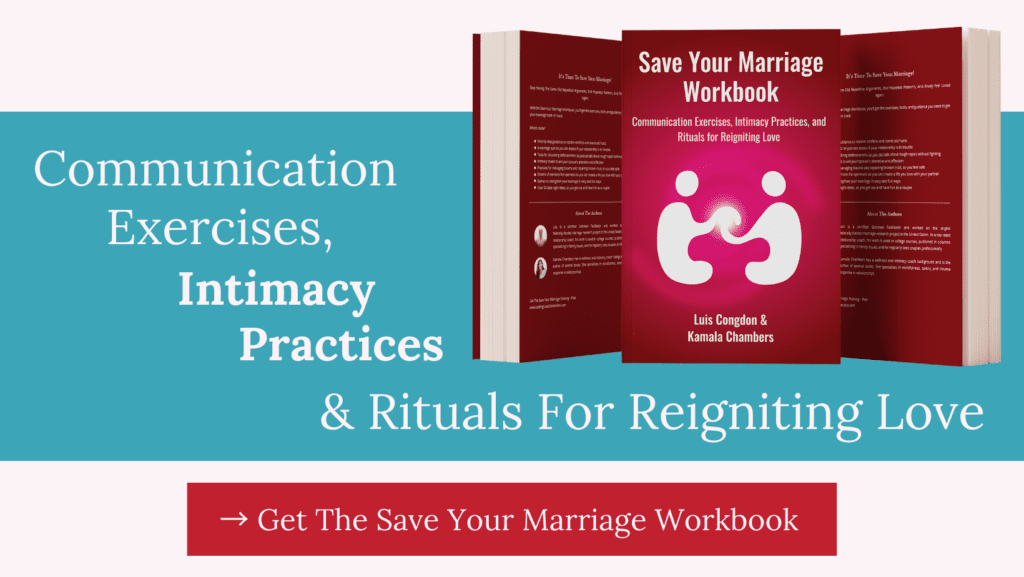To know how to rebuild trust in your relationship, you need to feel safe.
Trust is one of those things that is hard to build and easy to lose.
While it takes time and commitment, trust can be rebuilt.
However, it is possible to repair a broken relationship and restore trust again.
Table of Contents
How to rebuild trust in your relationship? – Follow these steps
- Admit there are issues of distrust
- Take responsibility for creating the problem together
- Find your role in co-creating the issue – and we always have a part
- Be honest about how you contribute to the issue (then tell each other)
- Start practicing full transparency in an open and kind fashion
- Recommit as a couple to rebuild the trust, love, and connection
- Practice appreciation, affirmations, and acknowledging what’s right in the relationship.
If your relationship has had issues with infidelity, cheating, or lying about something – rebuilding trust is crucial to making the relationship last.
Seeking professional help from a relationship counselor or coach allows you to develop tools for healthy communication and re-establishing trust.
You can’t overlook a lack of trust.
It doesn’t matter if the distrust has to do with:
- Lying about feelings
- Changing facts to avoid uncomfortable conversations
- Withholding information details about past experiences
- Hiding details about how money is spent and used
- Lying about an affair
- Absconding and keeping secrets about what you do with your day
- Falsifying facts about something so your partner won’t know the full details
How To Rebuild Trust In A Relationship After Lying?
Lying in a relationship is one of those signs of an unhealthy relationship that destroys connection, intimacy, and closeness.
The bigger the lie, the faster it rots the health of a relationship, but even those tiny lies can grow like mold and, bit by bit, destroy the healthiness of any connection.
Trust issues left unchecked grow like small cancerous cells that metastasize into something deadly. Catch the issue as soon as possible, and avoid having it destroy your relationship.
Once trust has been broken, it may seem like your husband hates you or your wife hates you. You may be unsure whether they’ll be able to trust you again.
However, you can take the steps outlined in this article to build, maintain, and rebuild trust.
A healthy relationship is built upon love, closeness, intimacy, transparency, and appreciation.
As we go through the steps to rebuild trust, we’ll look at how to increase the love and connection so your trust-building efforts have a full-spectrum and holistic approach.
To Rebuild Trust, Both People Need To Feel Safe Telling The Truth
“I’m scared to tell you the truth because you get angry and threaten to leave.”
“I don’t tell you because you’ll get nasty if I do.”
Couples who struggle with creating safe, honest, and open communication say phrases like this to each other.
One person withholds information and lies because they’re afraid of losing the goodness in the relationship. And, of course, the person lied to feels taken advantage of and gets angry.
On the surface, it’s clear who’s to blame and who’s at fault. The person who lied is the villain, and if you’re deceived, you’re the victim.
This is how most of us have been raised.
One person is to blame; the other is somehow blameless and holds no responsibility.
In this kind of narrative, where one person is to blame, and the other partner doesn’t play a role in the issue, we have a hero, villain, and victim. This may work in the movies, but there can’t be victims, villains, and heroes in relationships where love is the goal.
In a healthy partnership, couples come together and find out together how they both created the issue and do the work together to fix the problem.
Rebuilding Trust Takes Two
In a healthy relationship, both people take responsibility for issues and find ways to create solutions together.
As a counselor, I hear stories of partners who lie daily, and each time it’s clear that both people play a role in the issue.
The other day, while working with a couple, a wife said to her partner:
“I didn’t tell you because if I knew if I did, we’d be fighting like this. I hate when we fight, and you don’t listen to me without going off the walls.”
To which the husband responded:
“Of course, I’m pissed. Let’s end the relationship now!”
Though they’re arguing about why the lying happens, and they’re both blaming, the work is to get them to work together.
How to regain trust in a relationship after lies?
As their counselor, my job is to help them come together to see their role in the issue and find a solution together. So, the work ahead is helping them realize there isn’t a good guy, a bad guy, or a victim and villain.
As we sit in the office and talk further, they both realize something.
The wife is afraid to express herself because if she does, she’s met with threats of ending the relationship. So her choices are to tell the truth and be met with threats of ending the marriage or to lie and have harmony. Though she knows lying is wrong, she doesn’t feel like she has many choices. So she lies to avoid his anger and threats to end their relationship.
Meanwhile, the husband feels justified in blowing up and threatening to end the relationship. He feels like he has to blow up to pound her will into submission and make her tell the truth. But as he talks about his anger, he begins to thaw to the idea that maybe he, too, plays a role in this issue.
They both admit they don’t want the lying and bouts of anger to continue. The pattern is unhealthy, and they both feel stuck.
On the surface, anyone observing the issue might say the husband is the victim, and the wife is a villain. But upon deeper introspection, it’s clear they both have a role. His repeated bursts of anger contribute to her fear, and her lies add to his rage. So they’ll have to recognize their role in the situation to solve the problem.
Rebuilding Trust Requires Taking Responsibility
All issues between couples are created together and solved as a unit.
To solve anything, all healthy couples take responsibility for their part in the issue (and there’s always something we contribute to making the problem exist).
Returning to the couple, their healing process leads them to discover how they co-create the issue.
In our sessions, the angry husband discovers that by blowing up and threatening to leave, he also compromises his wife’s ability to share openly. Though she’s wrong for lying, he begins to see that his anger makes her afraid to communicate with him openly. Listening to his wife, he begins to see how his anger pushes her to hide her thoughts and feelings.
This is a significant breakthrough. Understanding how both people contribute to an issue is always the first step to getting a couple to talk and work together.
Similarly, the wife sees that by lying, she triggers her partner’s fears of being taken advantage of and deceived, which further agitates his outbursts of anger.
This is where the healing begins.
The couple commits to owning their shared experiences as we meet in our sessions. They decide to stop blaming, being victims, or pointing fingers. Instead, they choose to work together to solve their trust issues.
Contrary to most people, building trust in a relationship is always a two-way street. It may not appear that way, but committed couples will do the work to take responsibility together. Playing the blame game never works.
To rebuild trust, your relationship needs safety.
To find healing, the husband and wife follow a proven process, something that works to rebuild trust.
That process of rebuilding trust
- Admit there are issues of distrust
- Take responsibility for creating the problem together
- Find your role in co-creating the issue – and we always have a role
- Be honest about how you contribute to the issue (then tell each other)
- Start practicing full transparency in an open and kind fashion
- Recommit as a couple to rebuild the trust, love, and connection
- Practice forgiveness, appreciation, and acknowledgment of what’s good together
Even in relationships where one person cheated, recovering after infidelity always requires both people to participate actively in recovery.
If your relationship has issues of lying, here’s what to ask yourself to find your role in the issue
- In what ways do I feed the cycle of lying?
- How do I contribute to the issues of distrust?
- What do I do that makes my partner feel unsafe?
Both people can answer these three questions. Whether one or both of you lie, these questions can be answered and must be looked at by both partners.
To rebuild trust, couples have to tell some hard truths. But, once they both take responsibility and share honestly, an opening and love can come back.
How To Rebuild Trust, Start Being Transparent
You’re likely wondering, “Is it even possible to heal after the ways my partner has hurt me or I’ve hurt my partner so deeply?”
Rebuilding broken trust is not a once-and-done type of thing. It’s a process that requires checking in with each other on a continual basis.
Just like lying sows the seeds of doubt in your relationship, being honest consistently eventually blossoms and grows into a healthy, trusting connection.
One way to actively rebuild trust is to practice a radical method of complete transparency. Unfortunately, most people don’t know how to do that.
This kind of communication differs from blaming, shaming, or pointing fingers.
To rebuild trust, you must work to communicate in a way that helps create safety and open communication. To do that, try asking yourself some of these questions:
How can you talk about an experience, a feeling, or a thought without creating a fight?
How can you have an open and honest conversation without attacking, making your partner wrong, or having them become defensive?
Unfortunately, most people have never been taught honest communication that doesn’t accuse, make you a victim, or villainize your partner. So, answering these questions usually takes some coaching.
Open and honest communication that doesn’t attack or defend is radical, yet it’s the fastest way to create an open and safe dialogue.
The Save Your Marriage Workbook Can Mend The Hurts In Your Relationship

To Rebuild Trust, Practice The Three A’s
Healthy, sexy, passionate relationships all have one thing in common.
All of them have a strong imbalance of appreciation.
In a world that tells you to seek balance, your relationship works better when it’s unbalanced with positivity, appreciation, and acknowledgment.
Any relationship suffering from issues of distrust is also afflicted with feelings of hurt, negativity, and pain.
If you’re wondering how to repair a relationship when trust is broken, you need to create an environment where the good outweighs the bad.
As you may have seen in our interview, we discuss the keys to lasting love with renowned marriage researchers Drs. John and Julie Gottman. The happiest couples maintain a high ratio of positivity over negativity. To do this, Gottman’s research found that successful couples say five positive things for every negative statement.
Interview with renowned marriage researchers, Drs. John and Julie Gottman
This isn’t to say that happy couples keep tabs; if they say something negative, they say five positive things immediately after a mishap. Instead, couples with great marriages foster an environment where their words of affirmation, appreciation, and acknowledgment far outweigh statements that hurt or damage the relationship.
To rebuild the trust, you and your partner will do well to practice the Three A’s. Once you do more of this, you’ll increase the connection, love, and appreciation, which will help curb those hurt emotions and inspire more intimate and truthful communication.
To practice the Three A’s, try some of these ideas:
Acknowledge
When your partner says or does something that you like, tell them. Say it out loud. Text them or acknowledge it somehow, ideally acknowledge verbally.
Affirm
If your partner has a quality you appreciate, say it. Affirm your love, admiration, and appreciation by saying it.
Appreciate

To increase the love and appreciation for your partner, do something kind. For example, try a nice simple date. One of these date ideas will make it easy (I have ideas listed here that cost nothing and are scientifically proven to help couples).
Affirm your love by making a gesture to acknowledge it or do it simply because you want to show appreciation and increase the good feelings.
And if you’d like to amp up those good feelings, try my Appreciation Game. After working with 1000+ couples, these questions have helped increase connection in just a few minutes.






0 Comments